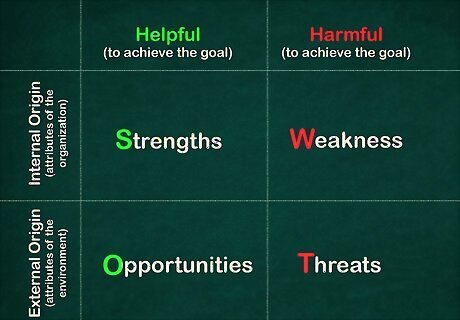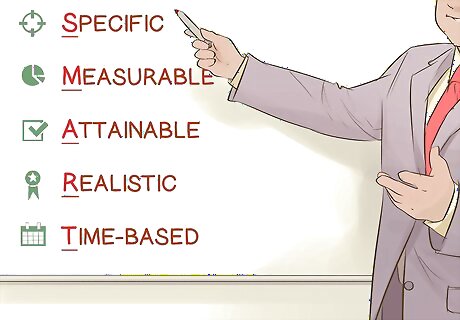
views
Assessing Your Current Situation

Sit down to write a professional growth plan. Some employers require that you create a professional development plan with the human resources department. However, the only way to create a truly effective growth plan is to take the time to do it yourself and on your own time. This way, you can create a growth plan that doesn't necessarily need to involve your current employer. Create a special folder in your computer for recording your growth plan. Spend at least 30 minutes following through these steps and recording your answers. EXPERT TIP Adrian Klaphaak, CPCC Adrian Klaphaak, CPCC Career Coach Adrian Klaphaak is a career coach and founder of A Path That Fits, a mindfulness-based boutique career and life coaching company in the San Francisco Bay Area. He is also an accredited Co-Active Professional Coach (CPCC). Klaphaak has used his training with the Coaches Training Institute, Hakomi Somatic Psychology, and Internal Family Systems Therapy (IFS) to help thousands of people build successful careers and live more purposeful lives. Adrian Klaphaak, CPCC Adrian Klaphaak, CPCC Career Coach Your growth plan can help you clarify your goals. Career coach Adrian Klaphaak says: "You don't have to perfectly define every last part of yourself when you're making a professional growth plan. The important thing is to reconnect to yourself before you start exploring career possibilities. Doing that can give you confidence in the value that you bring and direct you toward careers that fit you."

Determine how well your career is progressing at the moment. Many people never stop to take a good, hard look at their current situation. However, this part is crucial in determining why you want to set a new professional goal. Look at your career and its progression over the past three to five years. Think about whether you are making progress as quickly as you would like to and whether that progress has been in the right direction. What aspects are you succeeding in and which need work? Any negative assessment can be a strong reason to begin developing a professional growth plan.

Figure out what needs to change. Your general assessment of your career may have revealed some areas in which you could improve or your situation could be better. Now, take time to think about what, specifically, needs to change. Are you under-appreciated at your current position/company? Are you in the wrong industry? Understanding what could be changed to improve your situation will help you figure out your goals and the steps you'll need to take to achieve them.

Recognize your transferable skills. Transferrable skills are those skills that can be applied to different jobs that you might have in the future, like interpersonal or organizational skills. Understanding your transferable skills will help you plan your future career moves and give you the ability to effectively communicate your strengths to future employers. Identify these skills by thinking back over your career to what you have excelled at. Write down specific actions or tasks that you have done well and then group these into three or four categories. These should not be attributes, like "hardworking" or "integrity," but skills, like data processing or financial analysis. Expand on each of your skill categories with a few concise sentences that describe what exactly you excel at in that category. Include notable examples in which you demonstrated that skill. Doing so will help you better describe your skills on your resume or in future interviews. Your transferable skills can also be a jumping-off point for figuring out where to go next professionally.
Setting Goals

Write down specific professional goals. Think about your ultimate goals for your career. What do you want to eventually achieve? Be as specific as possible by using the SMART method for defining goals. This means defining goals that are specific, measurable, attainable, realistic, and time-based. Doing so ensures that you can actually tell when you have reached your goal. For example, it's difficult to gauge your progress towards "have a higher salary," but easy to see how close you are to "earning $20,000 more annually." Include intermediate goals between now and your larger professional goals. For example, try considering where you want to be in two years as you work towards your five-year goal. Alternately, you can start from your main goal and then work backwards from there to identify intermediate goals. Make sure your goals actually mean something to you. That is, choose and focus on careers that motivate and inspire you. For example, you may be working as an administrative assistant, but feel excited by the idea of managing your own projects for the same company. Or maybe you are a marketing manager for a large company and are energized by the thought of starting your own marketing firm. EXPERT TIP "If you don't clarify your goals, you may feel overwhelmed and directionless while looking for a new career." Adrian Klaphaak, CPCC Adrian Klaphaak, CPCC Career Coach Adrian Klaphaak is a career coach and founder of A Path That Fits, a mindfulness-based boutique career and life coaching company in the San Francisco Bay Area. He is also an accredited Co-Active Professional Coach (CPCC). Klaphaak has used his training with the Coaches Training Institute, Hakomi Somatic Psychology, and Internal Family Systems Therapy (IFS) to help thousands of people build successful careers and live more purposeful lives. Adrian Klaphaak, CPCC Adrian Klaphaak, CPCCCareer Coach

Perform a gap analysis. Determine if there are specific gaps in your knowledge, technical skills, or other expertise that might prevent you from attaining your desired position. Try looking at a job posting for the position that you want and comparing the required competencies of your own. Make a list of the skill areas in need of strengthening. Include any additional degrees or certifications that you might need.

Consult with a mentor. Find experts in your intended career and ask them to mentor you. Your mentor may be a professor at your university, your supervisor at work, or a friend of a friend. Ask your mentor to guide you in writing your professional growth plan. This person can help you work through the steps you need to take and give you an assessment of how realistic your goals and timeline are. They also tell you how to gain the competencies you need.

List the steps you will take to reach your professional goals. Research how you can bridge the gap between your current skills and expertise and those required by your goal position. Look into education, intermediate roles, and other ways to gain these skills. Then, turn this knowledge into actionable steps that you can take. Make sure your steps follow in order; that is, make sure you can do each step without having already completed the step or steps after it. Specify the required actions and steps for achieving your career goals. For example, becoming a project manager at your present company may require asking your supervisor if you may take on more project responsibilities. If you are a new graduate, getting a job at an engineering firm may involve sending out resumes to local firms, speaking to your social network and/or cold calling the firms. Identify any professional obstacles, fears, or concerns. Reflect on any challenges that may be slowing your progress. For example, if your intended career requires you to speak in public and this is a fear, make a note of this concern. Address obstacles by strengthening your skills. For example, if you are afraid of speaking in public, plan to take a public speaking course. If your desired career requires proficiency in a specific computer application, sign up for a class at the local college, study online, or learn by reading the application manual. Be specific about the steps you will take to gain new skills.

Identify the resources required to meet your goals. Look into what educational courses, books, people, and other resources you will need to achieve your goal. Be sure to factor in the cost of these resources when determining your timeline. You may need to work and save for a time before you can afford to make a change.

Assign a time line to each action step. Setting a specific time by which you must complete particular tasks helps to minimize distractions by keeping you on track. If you plan to take a particular course, give yourself a deadline for completing it. Your professional growth plan also should include a time line by which you will achieve your ultimate career goal.
Achieving Professional Growth

Begin following your plan immediately. Start completing the goals listed in your growth plan and following the schedule you created. Stick to your plan as closely as possible, especially during the first few months. Remind yourself of your goals and the benefits that come with them when following your plan becomes difficult.

Reflect on your progress daily. Keep a journal to record your thoughts throughout the growth process. Record any doubts, setbacks, or difficulties you run into and write out how to overcome them. Celebrate any milestones you reach, no matter how small. Checking in on your progress regularly will keep you focused and motivated to move forward.

Revise your plan as needed. Be constantly re-evaluating your goal based on new information and opportunities. Situations, people, and the economy change over time, and your goals can change with them. If you find yourself wanting something different than your original goal, make a change by shifting around your steps and timelines to fit the new one. It's impossible to predict your situation in ten years, so keep your plan open to revision.

When you've reached your goals, set new ones. If you happen to luck out and achieve your highest original ambition, immediately set to work on defining a new growth plan. The successes of your first plan can be applied to a new one and allow you to reach higher heights than you previously thought possible. The main point is to not become stagnant in your career growth just because you've gotten to a good place. You should continuously learn and grow throughout your entire career, not just in the beginning.


















Comments
0 comment